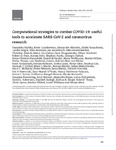Computational strategies to combat COVID-19: useful tools to accelerate SARS-CoV-2 and coronavirus research
Hufsky, Franziska
Lamkiewicz, Kevin
Almeida, Alexandre
Aouacheria, Abdel
Arighi, Cecilia
Bateman, Alex
Baumbach, Jan
Beerenwinkel, Niko
Brandt, Christian
Cacciabue, Marco
Chuguransky, Sara
Drechsel, Oliver
Finn, Robert D
Fritz, Adrian
Fuchs, Stephan
Hattab, Georges
Hauschild, Anne-Christin
Heider, Dominik
Hoffmann, Marie
Hölzer, Martin
Hoops, Stefan
Kaderali, Lars
Kalvari, Ioanna
von Kleist, Max
Kmiecinski, Renó
Kühnert, Denise
Lasso, Gorka
Libin, Pieter
List, Markus
Löchel, Hannah F.
Martin, Maria J.
Martin, Roman
Matschinske, Julian
McHardy, Alice C.
Mendes, Pedro
Mistry, Jaina
Navratil, Vincent
Nawrocki, Eric P.
O'Toole, Áine Niamh
Ontiveros-Palacios, Nancy
Petrov, Anton I
Rangel-Pineros, Guillermo
Redaschi, Nicole
Reimering, Susanne
Reinert, Knut
Reyes, Alejandro
RIchardson, Lorna
Robertson, David L.
Sadegh, Sepideh
Singer, Joshua B.
Theys, Kristof
Upton, Chris
Welzel, Marius
Williams, Lowri
Marz, Manja
SARS-CoV-2 (severe acute respiratory syndrome coronavirus 2) is a novel virus of the family Coronaviridae. The virus causes the infectious disease COVID-19. The biology of coronaviruses has been studied for many years. However, bioinformatics tools designed explicitly for SARS-CoV-2 have only recently been developed as a rapid reaction to the need for fast detection, understanding and treatment of COVID-19. To control the ongoing COVID-19 pandemic, it is of utmost importance to get insight into the evolution and pathogenesis of the virus. In this review, we cover bioinformatics workflows and tools for the routine detection of SARS-CoV-2 infection, the reliable analysis of sequencing data, the tracking of the COVID-19 pandemic and evaluation of containment measures, the study of coronavirus evolution, the discovery of potential drug targets and development of therapeutic strategies. For each tool, we briefly describe its use case and how it advances research specifically for SARS-CoV-2. All tools are free to use and available online, either through web applications or public code repositories.
Files in this item

